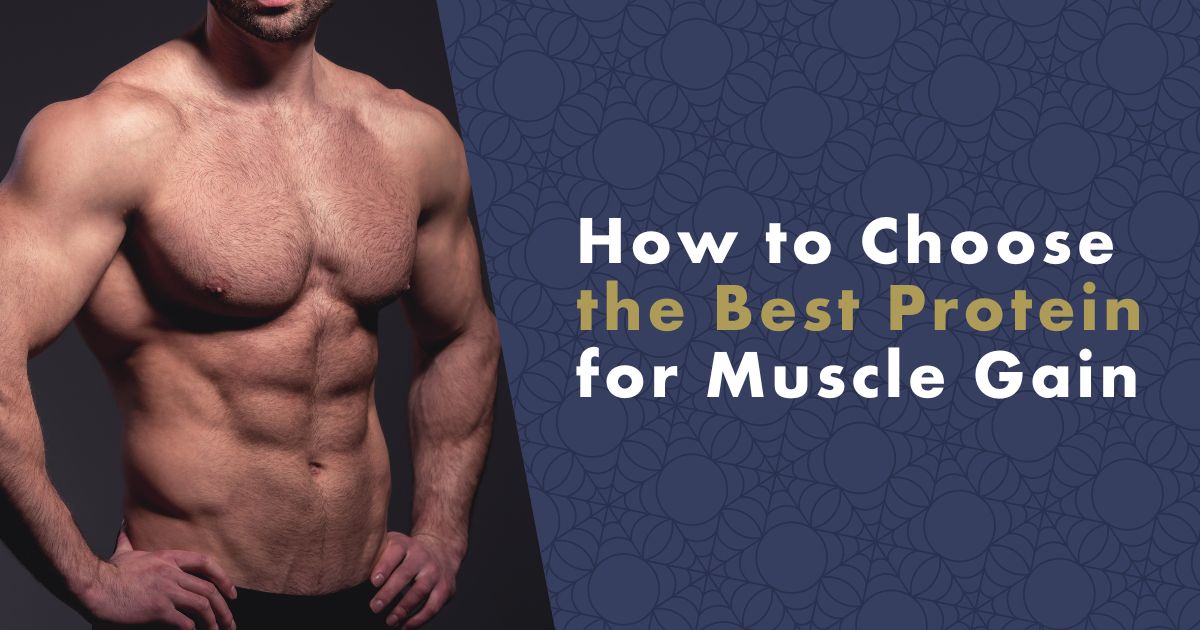Protein is an essential building block for the growth and regeneration of muscles. When you exercise, you create microscopic tears in your muscle fibers that need to be repaired and regenerated. This repairing and regenerating process requires protein. That's why dietary supplements based on proteins are particularly important for athletes and bodybuilders looking to gain muscle mass. In this article, we will explore the best proteins for muscle building.

Types of Proteins and Protein Drinks for Muscle Growth
Whey protein is arguably the most popular and effective protein for muscle gain. Casein protein is ideal for athletes seeking a prolonged protein supply for their muscles. Beef protein is a good alternative protein source for those with lactose intolerance. Soy protein and rice protein are good plant-based protein sources. Egg protein is easily digestible and has a high biological value.
Whey Protein
Whey protein is arguably the most popular and effective protein for muscle gain. It contains high amounts of essential amino acids and leucine, which are crucial components for muscle growth. Whey protein is rapidly absorbed into the body, making it an ideal choice post-workout.
Casein Protein
Casein protein is another popular protein for muscle gain. Casein is a slowly digestible protein, meaning it gradually releases into the bloodstream over several hours. This slow-release process can be advantageous for athletes seeking a long-term protein supply for their muscles. Casein protein is typically consumed before bedtime to ensure muscles are provided with sufficient protein throughout the night.
Beef Protein
Beef protein is an excellent source of protein for those seeking an alternative to whey protein or suffering from lactose intolerance. Beef protein has a high leucine and amino acid content, making it a good source to support muscle growth. Additionally, compared to whey protein, beef protein has a longer digestion time, providing muscles with protein for an extended period.
Soy Protein
Soy protein is suitable for those looking for a plant-based protein source. Soy protein contains high amounts of essential amino acids, including leucine, making it a good source to support muscle growth. Soy protein also contains phytoestrogens, known for their antioxidant properties that can help protect muscle cells from damage.
Rice Protein
Rice protein is another alternative for those seeking a plant-based protein source. Rice protein is suitable for individuals with lactose intolerance and soy allergies. Rice protein contains high amounts of essential amino acids, including leucine, making it a good source to support muscle growth. However, rice protein has a lower biological value than whey protein, meaning the body may not utilize all its proteins as efficiently.
Egg Protein
Egg protein is a high-quality source of protein that contains a significant amount of essential amino acids and is easily digestible. It is also referred to as the "gold standard" for protein due to its high biological value. Biological value is a measure of how well the proteins in food match the amino acid needs of the body. Egg protein is particularly suitable for people with lactose intolerance or soy allergies.
#produkty#https://www.nanospace.store/sport-dietary-supplements/
Why Do Bodybuilders Choose Protein Drinks with Collagen?
The combination of protein with collagen can be beneficial for athletes and bodybuilders looking to gain muscle mass. Collagen is a protein that makes up a significant portion of our muscles, tendons, and joints. When we exercise, our muscles undergo stress and repetitive strain, which can lead to damage to muscle fibers and a decrease in the elasticity and strength of tendons and joints.
Collagen consists of amino acids that are essential for the repair and regeneration of these damaged tissues. Collagen also contains the amino acid glycine, which can help protect joints and improve mobility. Glycine is a crucial component for collagen formation and can assist in maintaining healthy joints and tendons. Athletes and bodybuilders are often prone to joint and tendon injuries due to repetitive movements and intense training. The combination of protein with collagen can help strengthen joints and tendons and reduce the risk of injury.

What Other Supplements Help with Muscle Gain?
Supplements for muscle gain are often utilized by athletes, bodybuilders, and individuals looking to increase their muscle mass. These supplements are usually sold in the form of powders, capsules, or liquids and contain various substances aimed at promoting muscle growth.
Creatine
Creatine is another popular dietary supplement for muscle gain. It is a substance that naturally occurs in the body and serves as an energy reservoir for muscle cells. Adding creatine to the diet can increase the amount of creatine in muscle cells, leading to greater strength and muscle volume. Creatine is most commonly sold in powder form.
Beta-Alanine
Beta-alanine is an amino acid that helps the body produce carnosine, a substance that helps slow down muscle fatigue during exercise. By helping limit fatigue, beta-alanine can aid in performance during longer workouts and training sessions. Beta-alanine is typically sold in powder or capsule form.
BCAA
BCAA stands for branched-chain amino acids, which include leucine, isoleucine, and valine. These amino acids are important for muscle growth and can assist in muscle recovery after exercise.
Combination of Dietary Supplements
Many people utilize a combination of various dietary supplements to enhance the effectiveness of their training and muscle growth. Some of the most commonly used combinations include protein shakes, creatine, BCAAs, and beta-alanine, or protein shakes and BCAAs.
Tip: Also, read how to effectively lose weight.
Some Dietary Supplements May Have Undesirable Effects
It's important to realize that while dietary supplements can assist with muscle growth, they are still supplements and cannot replace a healthy and balanced diet and regular exercise. Therefore, it's crucial to maintain proper nutrition and adhere to your workout plan if you want to achieve results.
Some dietary supplements may also have side effects, such as digestive issues, bloating, or even kidney damage if taken in excessive doses. Hence, it's important to consult with a doctor or nutrition expert before using any dietary supplements.
FAQ – Frequently Asked Questions
Why is protein important for muscle growth?
Protein is an essential building block for the growth and regeneration of muscles. When you exercise, you cause microscopic tears in your muscle fibers that need to be repaired and regenerated. This repairing and regenerating process requires proteins. Hence, protein-based dietary supplements are particularly important for athletes and bodybuilders looking to gain muscle mass.
Is it better to consume protein before or after a workout?
Generally, it is recommended to consume protein both before and after a workout. Before a workout, protein can help support energy and performance during exercise. After a workout, a protein supplement can be beneficial for the recovery and restoration of damaged muscles. It's crucial to ensure that your body receives an adequate amount of protein throughout the day to support muscle growth.
Is it better to consume protein from food or protein supplements?
Protein supplements are usually easily digestible and have a high protein content, making them a suitable choice for athletes and bodybuilders seeking a way to get an ample amount of protein. However, consuming protein-rich foods such as meat, fish, and eggs can also provide significant amounts of protein and other nutrients like vitamins and minerals.
Can consuming protein lead to weight gain?
Yes, consuming protein can lead to weight gain. Protein supplements are usually high in calories and can provide the body with enough energy for muscle growth. However, it's important to monitor overall calorie intake and adjust it to individual needs and goals. Excessive calories, including those from protein supplements, can lead to an increase in body weight and the accumulation of fat if not burned through exercise or other activities.
What happens when I consume too much protein?
Too much protein can strain the liver and kidneys as they have to process and eliminate excess amino acids. Excessive protein consumption can also lead to dehydration because the body requires more fluids to process proteins. The recommended daily amount of protein depends on an individual's weight and physical activity, so it's important to monitor overall protein intake and adjust it to individual needs.
Is it possible to use protein as a meal replacement?
Protein supplements should not be considered a meal replacement as they may lack essential nutrients and fiber found in food. However, protein supplements can be used as part of a balanced diet to supplement overall protein intake and assist in supporting muscle growth. It's important to monitor overall calorie and nutrient intake to maintain a healthy and balanced diet.
Are protein supplements suitable for everyone?
Proteins are generally safe for most people. However, individuals with certain health issues, such as kidney problems, should consult a doctor before consuming protein supplements. People with food allergies should carefully check the ingredients of protein supplements and choose products without allergens such as soy, lactose, or gluten. It's also important to follow recommended dosages and not exceed the maximum daily protein intake. Before using any dietary supplements, it's always advisable to consult with a nutrition expert or a doctor.
Why are vitamins important for muscle growth?
Vitamins are important for muscle growth as they support the proper function of muscle cells and contribute to the formation of new muscle tissue. For example, B-complex vitamins are essential for utilizing energy from food and promoting the creation of new muscle cells. Vitamins C and E are antioxidants that protect muscle cells from oxidative damage and support muscle growth.
What dietary supplement is best for muscle growth?
There are many dietary supplements that are beneficial for muscle growth, such as proteins, amino acids, creatine, beta-alanine, and collagen. However, there is no clear-cut answer as to which supplement is the best, as each individual has different needs and goals. It's important to consider individual requirements and consult with a nutrition expert to choose the most suitable supplement for the person.
Which dietary supplement is most effective for muscle growth?
There is no definitive answer as to which supplement is the most effective for muscle growth because each supplement has its advantages and disadvantages, and effectiveness can vary among individuals. However, proteins are generally considered one of the most effective supplements for supporting muscle growth, as they are essential for the formation of new muscle cells and the regeneration of damaged muscles.
Is it possible to gain muscle without exercising?
It is highly unlikely for muscles to grow without exercise. Exercise is necessary to create microtears in muscle fibers, which are then repaired and regenerated, leading to an increase in muscle mass. Without exercise, there is insufficient mechanical stress on the muscles, which is essential for muscle growth. However, diet and dietary supplements can aid in supporting muscle growth in combination with regular exercise.
How to accelerate muscle growth?
Regular exercise, a healthy and balanced diet with an adequate intake of proteins, sleep hygiene, and dietary supplements can contribute to accelerating muscle growth. Supplements such as proteins, creatine, beta-alanine, and amino acids can aid in supporting muscle growth. However, it's important to keep in mind that muscle growth requires patience, consistency, and hard work.
How to support muscle growth after 40?
Muscle growth after the age of 40 may be more challenging due to a decline in testosterone and growth hormones. Nevertheless, regular exercise and a healthy diet (or appropriate dietary supplements) with sufficient protein intake can still help support muscle growth. It's crucial to monitor overall calorie intake and avoid excessive consumption of alcohol and sugar, which can negatively impact muscle growth. Additionally, dietary supplements like proteins, creatine, and collagen can aid in supporting muscle growth after 40.
Is muscle growth possible without dietary supplements?
Yes, it is possible to achieve muscle growth without dietary supplements. Regular exercise and a healthy, balanced diet with an adequate intake of protein are the most crucial factors in supporting muscle growth. However, dietary supplements can be useful to ensure an adequate intake of protein and other nutrients essential for muscle growth. It is important to consider individual needs and consult with a nutrition expert to choose the most suitable supplement for the individual.
Can women experience muscle growth?
Even though women have lower levels of testosterone than men, regular exercise and a healthy diet with sufficient protein intake can still help support muscle growth. However, it is essential to monitor overall calorie intake and not exceed the recommended dosage of dietary supplements. Additionally, supplements such as proteins and creatine can aid in supporting muscle growth in women.
What are the fastest ways to gain muscle mass?
There is no simple answer to the fastest way to gain muscle mass because each individual has different needs and goals. Nevertheless, regular exercise, a healthy and balanced diet with sufficient protein intake, and dietary supplements such as proteins and creatine can help support muscle growth. It is also important to maintain a proper sleep routine and not exceed the recommended dosage of dietary supplements.
How to support muscle growth without increasing body weight?
It is possible to support muscle growth without increasing body weight by focusing on quality exercise and a healthy diet with sufficient protein intake but with a slight caloric surplus. This means consuming more calories than you burn but not exceeding your energy intake too much to avoid an increase in body weight. Additionally, dietary supplements such as proteins, creatine, and collagen can help support muscle growth without increasing body weight.
How to build large muscles?
To achieve large muscles, it is important to consider several factors. Regular exercise is key to creating micro-tears in muscle fibers, which are then repaired and regenerated, leading to an increase in muscle mass. Furthermore, maintaining a healthy and balanced diet with sufficient protein intake is crucial for proper muscle regeneration and growth. Additionally, dietary supplements such as proteins, creatine, and beta-alanine can help support muscle growth.
Sources
- Wu, G., 2016. Dietary protein intake and human health. Food & function, 7(3), pp.1251-1265.
- Leidy, H.J., Clifton, P.M., Astrup, A., Wycherley, T.P., Westerterp-Plantenga, M.S., Luscombe-Marsh, N.D., Woods, S.C. and Mattes, R.D., 2015. The role of protein in weight loss and maintenance. The American journal of clinical nutrition, 101(6), pp.1320S-1329S.
- Carbone, J.W. and Pasiakos, S.M., 2019. Dietary protein and muscle mass: translating science to application and health benefit. Nutrients, 11(5), p.1136.
- Wolfe, R.R., 2006. The underappreciated role of muscle in health and disease. The American journal of clinical nutrition, 84(3), pp.475-482.
- Arentson-Lantz, E., Clairmont, S., Paddon-Jones, D., Tremblay, A. and Elango, R., 2015. Protein: A nutrient in focus. Applied Physiology, Nutrition, and Metabolism, 40(8), pp.755-761.
- Wolfe, R.R., 2000. Protein supplements and exercise. The American journal of clinical nutrition, 72(2), pp.551S-557S.
- Huecker, M., Sarav, M., Pearlman, M. and Laster, J., 2019. Protein supplementation in sport: source, timing, and intended benefits. Current nutrition reports, 8, pp.382-396.
- Marsh, K.A., Munn, E.A. and Baines, S.K., 2013. Protein and vegetarian diets. Med J Aust, 199(4 Suppl), pp.S7-S10.

